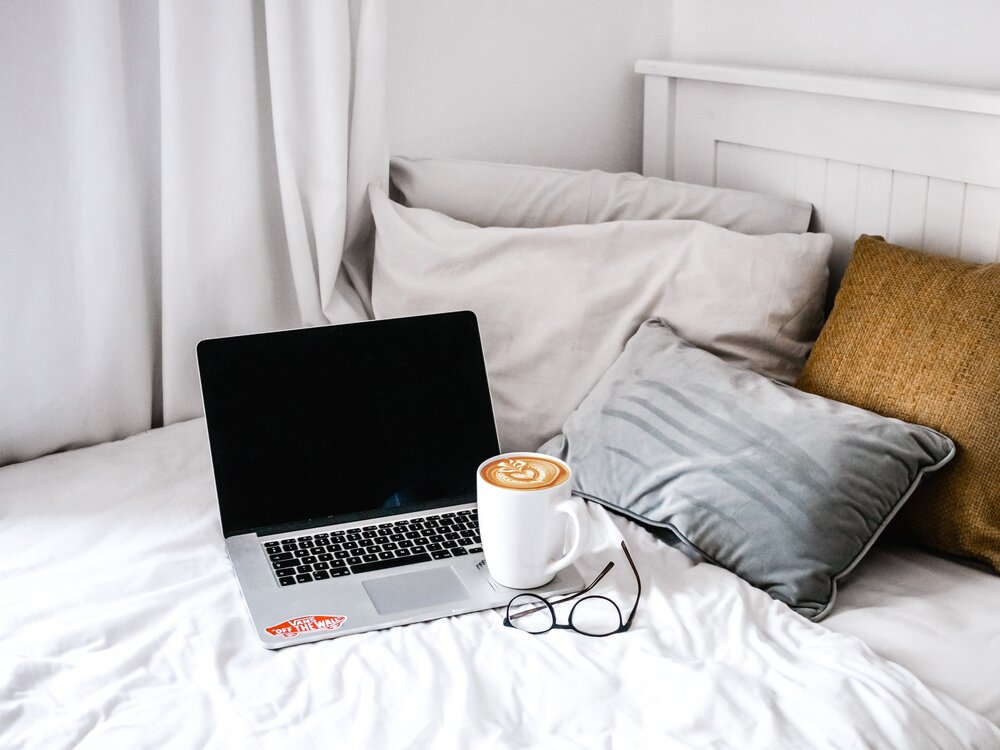
We are truly lucky to have access to the technology that we do. Even as I sit here typing this, it blows my mind that I can write a post on my laptop, post it on the internet, and people from all over the world can read it.
But unfortunately, with our lives going more digital these days, it’s easy to get swept up and feel like we are living the majority of our lives online.
We find ourselves constantly connected – email, texting, Facetime, social media… even our calendar and to-do lists are often on a screen.
I definitely believe technology can be used for the positive (and I’ll touch on that later), but without setting boundaries, it can cause us to feel burnt out, compare ourselves, waste time, and remove ourselves from the present.
A scroll here and an inbox refresh there may seem harmless, but it adds up quickly.
I think the biggest hurdle is that nowadays, we all utilize technology the majority of the day for our jobs, school, etc. So what is a realistic way to be mindful with it?
Here are a few ways to set boundaries with technology, so we can be mindful of our screen time and prevent burnout.
- Analyze your current usage time by logging how much time you are required to be on a screen for the day (work, school, etc.) and how much recreational time you spend on technology per day. You may need to track this for a week or two – we often underestimate the amount of time we are plugged in.
- Plan out periodic breaks to step away from tech and get some fresh air, exercise your eyes or talk to a colleague or peer in person. We often find that time slips by by without us taking stock of the fact that we have been zoned in on a screen for hours on end.
- Set expectations with yourself as far as checking your email, messaging apps, etc. – and then communicate your boundaries with your friends, family and coworkers. People only expect what we allow – so don’t be afraid to lay down a few rules as far as how often you check your messages, when you can realistically get back to them or even your preferred method of communication. It’s easy to think that every message is urgent, but this only leads to stress and overwhelm. Setting boundaries is part of respecting your time and mental health.
- Create a designated time to unplug each day and week whether it’s an hour before bed or every Sunday. Time totally unplugged brings us back to the present, clears our minds and gives us the space to enjoy ourselves. While we don’t need to completely abandon our tech-driven lifestyles, we do need to make time to get away and reconnect with ourselves offline. Related: 15 Simple Ways to Enjoy The Little Things in Life
- When you spend time with friends and family set the tone by communicating that you want to be intentional about your time together by silencing your phones or keeping the phones stacked up together so they are out of reach .Genuine connection happens in real time. While we’ve come along way with modern technology, it will never replace the feelings you get from spending quality time together.
- Delete apps from your phone that you do not need. This act of simplifying will lessen the urge to turn to your phone when you are bored or procrastinating.
With all of that being said, technology can greatly aid our mindfulness practice as well. Two of my favorite apps are the Headspace Meditation app and the Mindfulness Daily app. Both aim to reduce stress and anxiety by adding a little calm and clarity to our day through guided meditations, mindfulness tools and inspiring life insights.
At the end of the day, just like everything else in life – too much of a good thing can turn into a negative experience.
Be mindful of how you interact with technology, and more importantly, the feelings that it creates for you – and adjust accordingly. Technology isn’t going anywhere anytime soon, so the sooner we learn how to approach it in a healthy and mindful way, the better.
Learning how to adapt and support ourselves in the digital age is crucial in terms of our mental health, feelings of connectedness and overall well-being.
What’s your biggest culprit when it comes to unplugging completely? Leave me a comment below!

